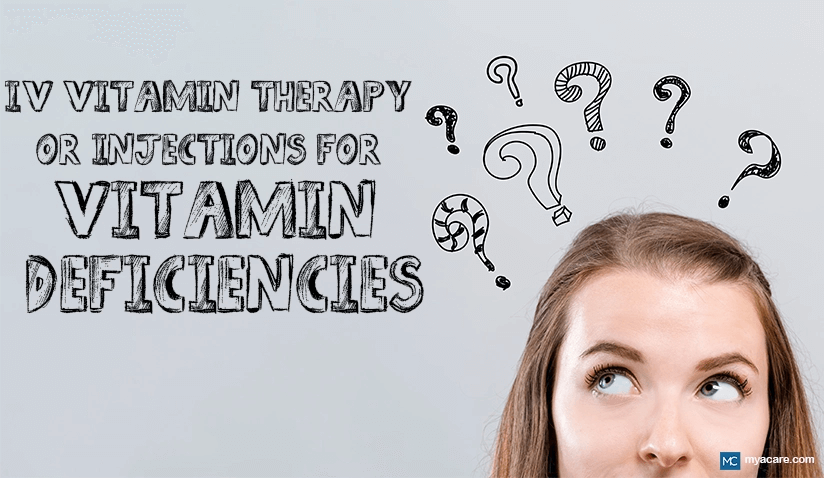Comparing IV Vitamin Therapy vs. Injections for Vitamin Deficiencies

Medically Reviewed by Dr. Rosmy Barrios - September 30, 2024
Vitamins are critical nutrients our bodies need to function correctly. They are paramount to maintaining our overall health and well-being. However, sometimes, our bodies may not get enough vitamins from our diet, leading to vitamin deficiencies. In such cases, vitamin IV/injections can quickly and effectively boost our vitamin levels.
The blog below details the pros and cons of vitamin IV/injections for vitamin deficiency.
What Is Vitamin IV Therapy?
Vitamin IV (IntraVenous) therapy, or vitamin infusion therapy, involves administering vitamins directly into the bloodstream intravenously through an IV drip. Vitamin infusion is a widely utilized treatment for severe vitamin deficiencies.
It differs from taking vitamins orally as supplements because it bypasses the digestive system[1]. Since vitamin IV therapy bypasses the digestive system, it can be effective for immediate absorption, but the efficiency may depend on the type of vitamins administered.
The effects and results of vitamin IV therapy can often be seen within hours or a few days after the infusion, depending on the individual and the specific treatment.
People might consider vitamin IV therapy for various reasons, including[2]:
- Treating vitamin deficiencies caused by malabsorption or compromised digestion.
- Optimizing nutrient intake.
- Providing a quick health boost.
- Boosting immunity.
- Increasing energy levels in those with chronic fatigue or weakness.
- Promoting overall health and wellness.
- Aiding recovery from certain medical conditions or after intense physical activity.
The duration and frequency of vitamin IV therapy can change depending on the individual's requirements and the treatment plan as directed by a healthcare professional.
Vitamin IV vs. Vitamin Injection
Vitamins delivered via IV and injection differ in their mode of administration[3]. In many cases, the delivery method depends on what the condition requires.
Vitamin IV delivery involves inserting a needle into a vein before allowing the contents to infuse into the body gradually. It differs from a vitamin shot in several ways:
- Faster absorption of vitamins as they are delivered directly into the bloodstream.
- The infusion rate can be sped up or slowed down.
- It takes a longer time to complete.
- The dosage is diluted. Dilution may provide additional benefits, such as enhanced hydration.
- Commonly used to treat severe nutrient deficiencies, dehydration, or to support overall wellness.
- Increased risk of fainting[4].
The cost of IV therapy is generally higher than shots, as it requires specialized equipment and monitoring by healthcare professionals.
Vitamin injections involve the insertion of a needle into a vein, muscle, or fat tissue. This type of infusion is over quickly and may take longer to diffuse into the body. Vitamin shots differ from IVs in the following ways:
- The vitamins take slightly longer to diffuse through muscle or fat before reaching the bloodstream.
- It is over within a few seconds.
- Shorter duration of action.
- The dosage received may be less.
- Lower risk of fainting.
- Healthcare professionals often prefer injections for localized treatment or when IV access is difficult.
Different Types of Vitamin Infusion Therapy
Various vitamin therapies are available, targeting specific deficiencies or health goals. They can contain either water-soluble or fat-soluble vitamins.
Common types of vitamin therapy include:
- B vitamin complex for energy and nerve function
- Vitamin D for bone health
- Vitamin K for blood clotting
- Vitamin C for combating deficiency and enhancing immune function
Several clinics offer these therapies in both IV and injection forms.
Some formulations include a combo of vitamins and minerals, such as the Myers’ cocktail. The "Myers’ cocktail" is a scientifically backed IV therapy that incorporates a mixture of vitamins and minerals, including vitamin C, B vitamins, magnesium, and calcium. It can help to enhance immune function, boost energy levels, and support overall health.[5]
Vitamin therapies for fatigue frequently include Coenzyme Q10, L-carnitine, zinc, and amino acids like methionine to boost their effectiveness.[6]
When Are Vitamin Drips Taken?
Vitamin infusions target a wide array of health conditions and symptoms, such as:
- Severe Deficiencies: When oral supplements prove insufficient, IV therapy can rapidly boost essential nutrients for conditions like iron deficiency anemia, B12 deficiencies, or some instances of malnutrition.
- Malabsorption Issues: Conditions like Crohn's disease or celiac disease can hinder nutrient absorption. IV therapy bypasses this issue, ensuring proper delivery.
- Specific Medical Conditions: In some cases, specific medical conditions like hyperemesis gravidarum (severe nausea and vomiting in pregnancy), thyroid conditions, or certain metabolic disorders may benefit from IV therapy as prescribed by a healthcare professional.
- IV Hydration Therapy: Beyond vitamins, IV fluids can rehydrate and replenish electrolytes lost through dehydration, fever, or vomiting, offering rapid recovery.
- Cognitive Difficulty: Certain B vitamins in IV drips may actively alleviate brain fog, although this remains scientifically unconfirmed.
- Dry Skin: IV therapy can improve skin hydration and appearance, although it does not directly cure dry skin. Instead, those deficient in vitamins often have dry skin, which IV therapy can help treat.
- Chronic Fatigue: Persistent fatigue caused by nutrient deficiencies or electrolyte imbalances may benefit from IV drips.
- Chronic Pain: There is scientific evidence to support the use of vitamin IV/injections for certain pain disorders, such as fibromyalgia.
- Migraines and Headaches: IV therapy containing specific minerals and electrolytes may temporarily relieve migraines. However, there is a need for more research on the long-term efficacy.
This list is not all-encompassing. You could benefit if you have chronic symptoms or a chronic lifestyle disease. Consult a qualified healthcare professional to check your nutritional status and to decide on an appropriate vitamin therapy to suit your needs.
Vitamin IV Therapy for Cancer Treatment: Does It Work?
Some medical professionals use vitamin IV therapy as a complementary treatment for cancer patients.
A study published in the journal Nutrients found that vitamin C IV therapy improved quality of life and reduced symptoms in late-stage cancer patients undergoing chemotherapy. Research indicates that vitamin C may have potential anticancer properties.
However, the effectiveness and validity of vitamin IV therapy for cancer treatment are still under debate. Cancer patients must consult with their healthcare team and follow evidence-based treatment plans.
Pros of Vitamin IV/Injections
Vitamin IV/injections can:
- Provide a higher vitamin dose than oral supplements because they bypass the digestive system.
- Be customized to meet individual needs, addressing any deficiencies.
- Be used for hydration therapy to rehydrate the body.
Cons of Vitamin IV/Injections
There are several drawbacks to vitamin therapies. For instance, vitamin IV/injections are:
- Not covered by health insurance and must be paid out of pocket. According to some sources, IV therapy may cost as much as $200-$400.[7]
- Not appropriate for everyone, especially those with contraindicated medical conditions such as kidney disease.
- Unable to replace a healthy diet or lifestyle.
- Not regulated by the FDA or other medical authorities. However, there are published guidelines for their safe use.
- Efficacy varies based on the formulation.
Before receiving therapy, you should carefully consider these treatments' potential risks and side effects.
Risks Associated With High-Dose Vitamin Therapy
As with any procedure, there are potential risks associated with vitamin IV/injections. Some risks include infection, allergic reactions, and harm to the veins. Overconsumption of vitamins can easily lead to varying forms of bodily toxicity. A few examples include:
- Vision changes from vitamin A overload: Excessive intake of vitamin A can cause vision concerns or changes in eyesight.
- Risk of kidney stones due to excess vitamin C: Consuming high doses of vitamin C increases the risk of developing kidney stones and iron overload.
- Loss of extra water-soluble vitamins: After exceeding the required intake, excess water-soluble vitamins (e.g., vitamin C, vitamin B) are eliminated from the body, resulting in potential nutrient loss. Severe cases can lead to refeeding syndrome.
It is essential to consult with a healthcare expert if you encounter any severe or persistent side effects.
Potential Vitamin IV Therapy Side Effects
Some people may experience side effects from vitamin IV therapy. These can include nausea, headache, and dizziness. These side effects are usually mild and subside quickly.
More serious complications include[8]:
- Air embolism leading to blood vessel blockage.
- Allergic reactions.
- Excessive vessel damage and blood clotting.
- Infections.
- Fluid creep (volume overload), an excessive build-up of body fluid caused by difficulties with handling extra blood volume.[9]
Some of these require prompt medical treatment to avoid life-threatening consequences.
Performing these procedures in a hospital actively minimizes risk. The hospital setting provides the necessary resources and expertise to manage complications. Healthcare professionals monitor the patient closely and take prompt action if needed.
On the other hand, vitamin injections can cause localized side effects such as pain and redness at the injection site, as well as mild diarrhea and itching.
Contraindications
Vitamin IV therapy may be unsuitable for those with medical conditions such as:
- Kidney/liver disease: Conditions that affect the normal functioning of the kidneys or liver.
- Heart failure: A term that describes insufficient heart function and inadequate blood flow as a result.
- Blood clotting disorders: Conditions that disrupt the body's normal blood clotting process, leading to excessive bleeding or clot formation.
- G6PD deficiency: A genetic condition where the body does not produce enough glucose-6-phosphate dehydrogenase, destroying red blood cells.
- Hemochromatosis: An inherited disorder where excessive iron is absorbed and accumulated in the body's organs, especially the liver.
Consult with a healthcare professional to determine safety and receive personalized advice.
Is Vitamin IV and Injection Safe to Be Taken at Home?
Some companies offer their customers a vitamin IV drip at home, allowing individuals to receive treatment without traveling. While this may be convenient, it is essential to consider that the potential risks are much higher in such a scenario.
You should ensure that the company is reputable and that they make use of quality equipment and supplies. It is also important to inquire if they employ trained healthcare professionals to administer the therapy.
Conclusion
Vitamin IV/injections can be a swift and compelling way to boost vitamin levels in the body. They are customizable, provide a high dose of vitamins, and have scientific evidence to support their use for particular medical conditions. However, there are potential risks and side effects, and therapy should not replace a healthy diet or lifestyle. It is necessary to consult with a healthcare professional before considering vitamin IV/injections and to have them administered by a trained professional. With proper precautions, vitamin IV/injections can be a beneficial tool in maintaining overall health and well-being.
To search for the best doctors and healthcare providers worldwide, please use the Mya Care search engine.
The Mya Care Editorial Team comprises medical doctors and qualified professionals with a background in healthcare, dedicated to delivering trustworthy, evidence-based health content.
Our team draws on authoritative sources, including systematic reviews published in top-tier medical journals, the latest academic and professional books by renowned experts, and official guidelines from authoritative global health organizations. This rigorous process ensures every article reflects current medical standards and is regularly updated to include the latest healthcare insights.

Dr. Rosmy Barrios is an aesthetic medicine specialist with international work experience. She earned her physician diploma at the Universidad Del Norte’s School of Medicine in Barranquilla, Colombia, and her specialty at John F. Kennedy University in Buenos Aires, Argentina. Dr. Barrios is a member of the Pan-American Aesthetic Medicine Association (PASAM) and the Union Internationale de Médecine Esthétique (UIME). She is an expert health writer with keen interests in aesthetic medicine, regenerative aesthetics, anti-aging, fitness, and nutrition. Currently, Dr. Barrios heads the Regenerative Aesthetics department at a renowned Internal Medicine clinic based in Belgrade, Serbia.
Sources:
Featured Blogs



